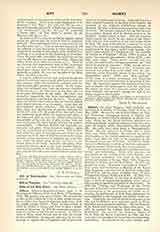

Gilbert de la Porrée (GILBERTUS PORRETANUS), Bishop of Poitiers, philosopher, theologian and general scholar; b. at Poitiers in 1076; d. in 1154; studied under Hilary in Poitiers, under Bernard of Chartres at the famous school there, and finally under Anselm at Laon, where he probably first met Peter Abelard. returning later to Chartres, he taught philosophy and the arts there for about fifteen years, receiving a canonry and holding at intervals the office of chancellor of the school. He was present at the Council of Sens (1141), at which Abelard was censured. The following year we find him teaching in Paris, with John of Salisbury among his pupils; but only for a brief space, for in 1142 he became Bishop of Chartres. His high character for learning and ecclesiastical zeal seems to have won for him the universal respect and veneration of his contemporaries. But his teaching regarding the Blessed Trinity involved him in trouble for a time. Two of his own archdeacons, alarmed at its novelty, reported it to Eugene III, and induced St. Bernard to oppose Gilbert’s doctrines in the pope’s presence at the Councils of Paris (1147) and Reims (1148). The dispute ended amicably without any very definite issue. Gilbert died universally regretted in the year 1154.
He lived and taught during the critical epoch when the great scholastic synthesis, both in philosophy and in theology, was just beginning to take shape. The principles, methods, and doctrines of purely rational research were being extended from philosophy to theology and applied—often rashly, as with Abelard—to the elucidation of revealed truth. Aristotle‘s philosophy was finding its way through Moorish and Jewish channels into the Christian schools of Europe, gradually to supplant Platonic influences there, and the discussion of the great central problem of the validity of knowledge—the controversy on the Universals, as it was then called—was waxing warm and vehement. Gilbert’s place among his contemporaries was a leading and honored one; while his philosophical writings secured for him a fame that long survived him. In his “Liber Sex Principiorum” he explained the last six categories of Aristotle, the latter having treated expressly only the first four. The work immediately took its place as a scholastic textbook, side by side with the “Isagoge” and the “Categories”, and was studied and expounded for three centuries in the medieval schools. His “Commentary on the Four Books of Boethius”, especially on the two “De Trinitate”, contain those applications of his doctrine on the Universals which for a time brought his orthodoxy under suspicion.
Gilbert’s attitude on the controverted question of the Universals has been very variously interpreted: as ontologistic realism (Prantl), empiric realism (Clerval, Zigliara), moderate realism ill-defined (de Wulf, Turner). The latter is, perhaps, nearest to the truth. Gilbert’s doctrine, like that of Abelard, is an attempt, though only partially successful, to repudiate the extreme realism of the epoch, with its pantheistic tendencies. The universal concept (of the genus or class) has corresponding to it in the world of sense a number of similar singular objects. This similarity is, however, explained by Gilbert in a way that brings it quite near identity. The created essence (forma nativa, eidos) of the individual member of a class is a copy of the Divine exemplar, “singularis in singularibus, sed in omnibus universalis” (John of Salisbury, Metal., II, xvii). He means that the forma nativa is not really (numerically) one and the same in omnibus, but only conceptually, i.e. by the consideration of the mind; so much is fairly evident from another reference of his to “universalia.. quae ab ipsis individuis humana ratio quodammodo abstrahit” (P.L., LXIV, 1374). Yet there are grounds for supposing that he attributed to the forma nativa, as it is in the individual, the universality of the logical concept. In the actual individual he distinguishes between the common or class essence which he calls subsistentia, e.g. “humanity” or “human nature” in the abstract, and that which makes it an existing individual and which he calls substantia, e.g. “Plato”. This process of objectifying and dividing off the abstract from the concrete, in the individual, he carried so far as to allege that in it “universality” was a distinct subsistentia, different from “singularity”, and that the “unity” of the individual was a subsistentia distinct from the individual which it made “one”. He thus mistook mental distinctions for real, and he carried his error into theology. Between God and His Divinity, the Father and His Paternity, the Son and His Sonship, the Holy Ghost and His Procession, the Divine Persons and the Divine Nature, he saw a distinction which is really due to our human way of grasping reality—as a concrete embodying an abstract, a singular containing a universal, an essence determined by an existence—but which Gilbert, with his Platonizing tendency to model the ontological upon the logical, conceived to be due to a division and plurality in the Godhead Itself. This was an excessive reaction against the Pantheism which would submerge all the real distinctions of things in an identity with one indivisible Divine existence.
Gilbert’s “Liber Sex Principiorum” and his “Commentary on Boethius” are in P.L., CLXXXIV and LXIV. He also left numerous commentaries on various books of the Old and New Testaments. A philosophical work called “Liber de Causis”, sometimes attributed to him, is in reality an abridged Latin translation, through the Arabic, of the “Elevatio Theologica” of Proclus, a Greek Neo-Platonist of the fifth century.
P. COFFEY

